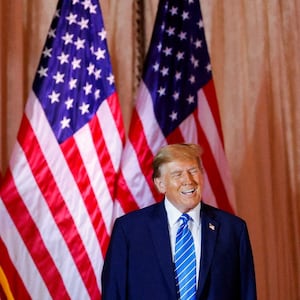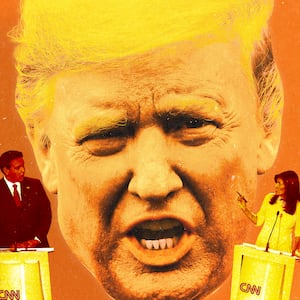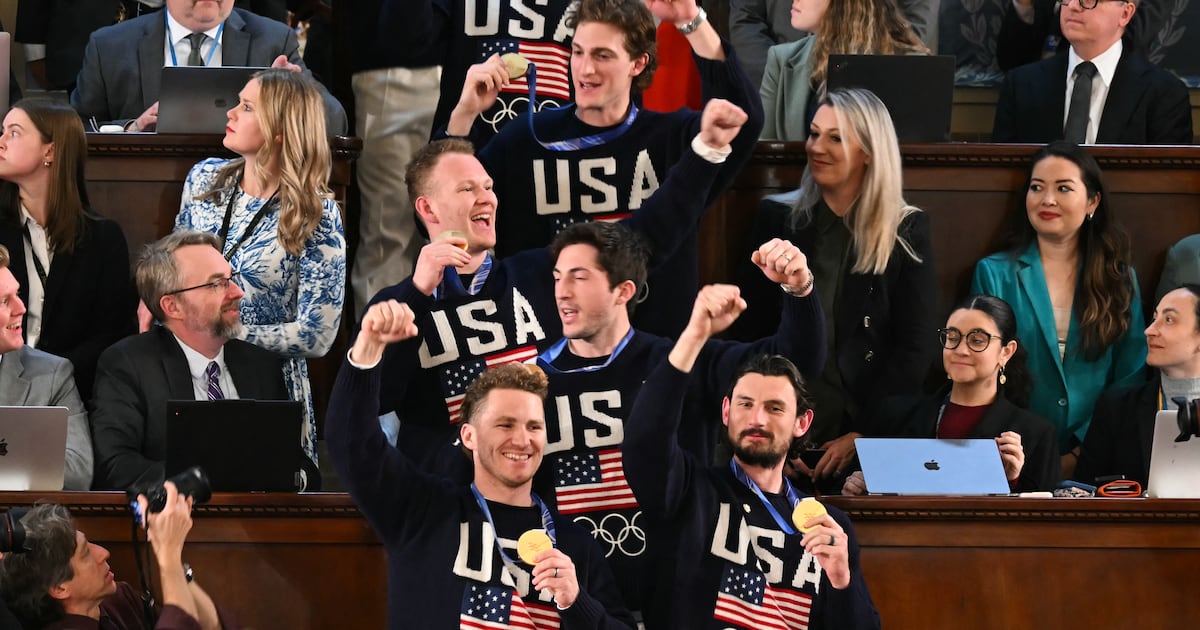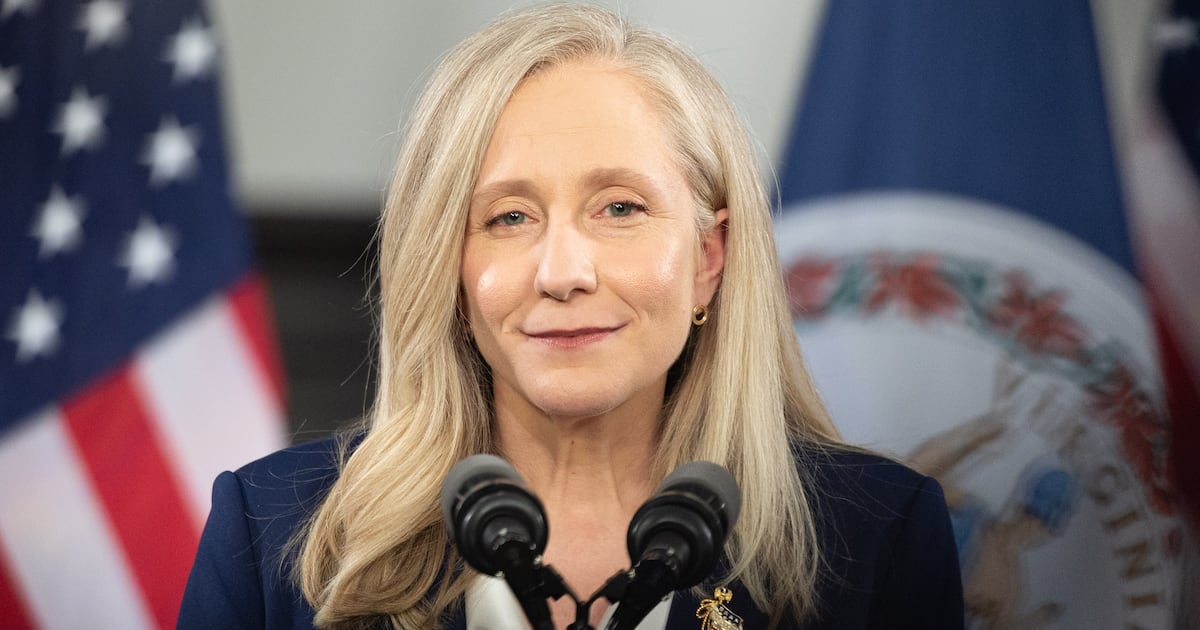In what could be his final State of the Union address, President Joe Biden poked and prodded Republicans on a number of issues—Ukraine, abortion, the border, even Jan. 6—contrasting GOP apathy with Democratic action as the general election campaign began in earnest Thursday night.
It was an unapologetically political speech, with Biden punching Republicans and Republicans punching right back. But Biden saved his sharpest contrasts, his most direct swipes, for the one Republican whose name he refused to mention: Donald Trump.
Biden repeatedly referenced Trump with titles like “my predecessor” and “the former Republican President,” avoiding his name throughout the entire speech even as he called Trump out repeatedly.
Just a few minutes into his address Thursday night, Biden noted that Trump had told Russian President Vladimir Putin to “do whatever the hell you want” with respect to Ukraine.
“A former American president actually said that, bowing down to a Russian leader,” Biden said. “It’s outrageous. It’s dangerous. It’s unacceptable.”
But Biden was just getting started with his criticism of Trump.
He dinged “my predecessor”—as well as “some of you here”—for seeking to “bury the truth” about Jan. 6. “I will not do that,” Biden said. “This is a moment to speak the truth and bury the lies.”
He attacked “my predecessor” for trying to overturn Roe v. Wade. “He’s the reason it was overturned. In fact, he brags about it,” Biden said.
He called out “my predecessor” for his record on COVID and causing a “mental health crisis of isolation and loneliness.” Biden said Trump “failed the most basic duty”—“the duty to care.”
He went on to accuse “my predecessor” of not buying American, of trying to take away health insurance for Americans, and of demanding that Republicans block a bipartisan border bill.
Biden’s constant calls back to “my predecessor” served multiple purposes. He was able to get overtly political without directly—by name—attacking Trump. But Biden also subtly connected the former president to the past, not the future, as both men argue about their age, ability, and record.
It was the topic of immigration, however, where Biden delivered his most relentless attacks on Trump and Republicans. He accused the GOP of “playing politics” with border security so they could preserve immigration as a campaign issue for Trump.
“I’m told my predecessor called Republicans in Congress and demanded they block the bill,” Biden said. “He feels it would be a political win for me and a political loser for him.”
At another point, Biden contrasted himself with “my predecessor” for offering a comprehensive immigration plan and making good on a bipartisan proposal to “secure the border.”
Ever since Republicans followed Trump’s orders to reject the bipartisan border security deal, Democrats have taken a more aggressive immigration posture on the campaign trail. They’ve made a sport out of labeling Republicans hypocrites for opposing a compromise bill they previously claimed was critical to addressing the “crisis at the border.”
Biden was so aggressive on immigration that he even went toe-to-toe with one of the most predictable troublemakers in Congress: Rep. Marjorie Taylor Greene (R-GA). In a testy, unscripted exchange, Biden responded to Greene—who was violating House rules by wearing a MAGA hat on the House floor—as she demanded Biden acknowledge Laken Riley, a 22-year-old nursing student who police say was murdered by an undocumented immigrant.
Biden called Riley “an innocent young woman who was killed.” And Biden adopted—either intentionally or not—GOP rhetoric on immigrants as he referred to Riley’s killer as “an illegal.”
While he certainly didn’t score any points with progressives for that dehumanizing term, he did seem to neutralize a Republican talking point about his refusal to address the murder.
Overall, however, this was a speech for Democrats. Biden used the State of the Union as an opportunity to run through Democratic accomplishments during the first years of his presidency, like an infrastructure bill, an economy that has defied expectations, and a prescription drug bill that lowered the cost of insulin to $35 a month for seniors.
Biden also noted that Democrats passed the bipartisan Safer Communities Act—the first major gun safety bill in three decades. (Meanwhile, Biden said, his “predecessor” told the NRA that he was “proud he did nothing on guns when he was president.” After a school shooting in Iowa, Biden also accurately recounted that Trump told people to “get over it.”)
Biden additionally tried to move the needle on stubborn negative perceptions of the economy by championing economic indicators that are trending in a positive direction after the COVID-19 pandemic.
“I inherited an economy that was on the brink,” he said. “Now our economy is the envy of the world.”
Biden made a conscious effort to brag about the economy, a departure from previous joint addresses when Biden was tentative about his economic accomplishments. This time, he boasted about 15 million new jobs in three years, unemployment near 50-year lows, and steady wage growth.
But Biden also didn’t shirk away from addressing inflation. He instead tried to empathize with Americans who still face the challenges of rising costs and presented it as a problem that Republicans were refusing to address.
“Snack companies think you won’t notice when they charge you just as much for the same size bag but with fewer chips in it,” Biden said with a laugh, imploring lawmakers to pass Sen. Bob Casey’s (D-PA) bill to “put a stop to shrinkflation.”
Biden seemed determined to make headlines for the political nature of his one hour and seven minute speech rather than giving a “sleepy” address. While he slurred and stuttered over some words, he tried to match the deeply partisan spirit that Republicans brought to the chamber Thursday night while delivering a high-energy performance.
The strategy seemed to work. Republicans emerged from the House chamber offended and ready to criticize Biden for his partisan shots, but what they weren’t doing was making the same jokes about his old age and confusion that kicked off the night.
Biden’s frequent asides and clear willingness to banter with Republicans seemed to quell the most effective talking point against the president—that he’s too senile to be president. Still, Biden also tried humor to neutralize that attack.
“In my career, I’ve been told I was too young,” Biden said, noting that, when he first came to Washington, “they didn’t let me on the Senate elevators for votes sometimes—not a joke.”
But he also noted that he’s been told, “I'm too old.”
Biden said the issue facing our nation wasn’t “how old we are—it’s how old our ideas are.”
“Hate, anger, revenge, retribution are among the oldest of ideas,” he said. “But you can’t lead America with ancient ideas that only take us back.”
He said to lead America, you need a vision for the future, one where “we defend democracy, not diminish it.”
“I see a future for all Americans,” he said.










